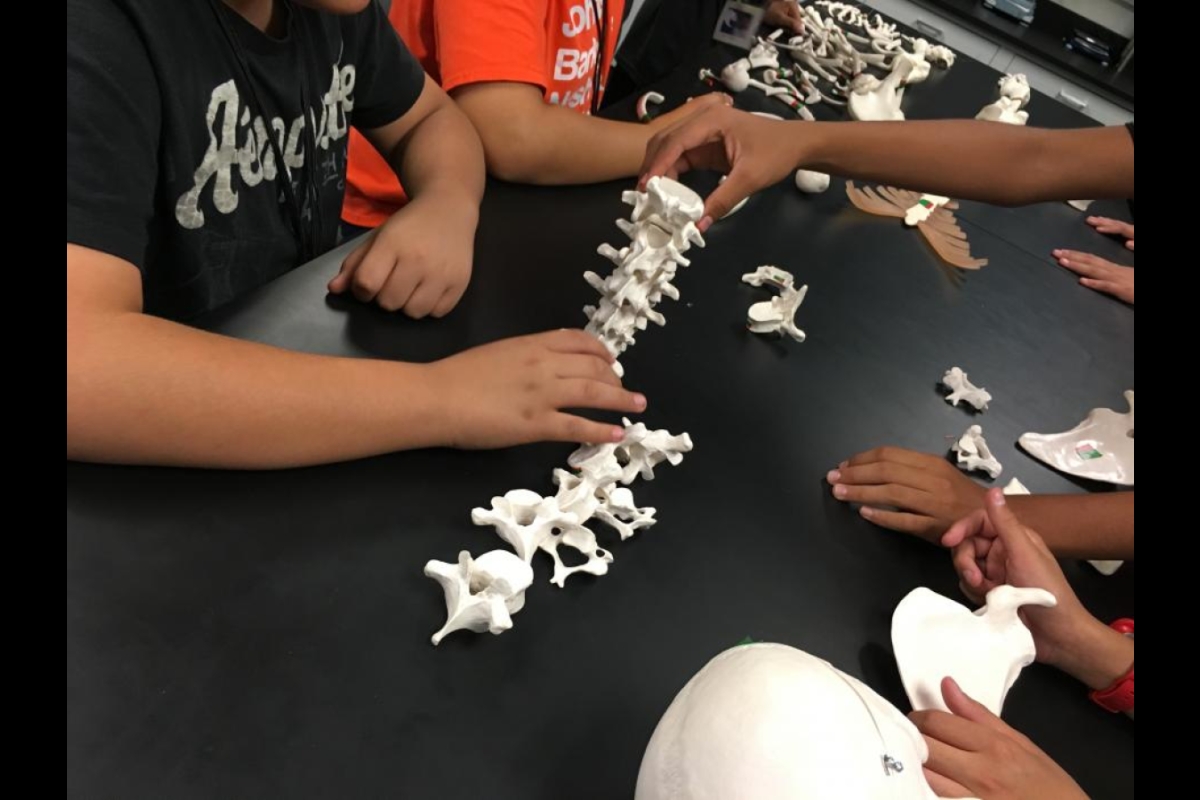Who stole the bones at ASU? That’s the question that eighth-grade crime solvers from Phoenix are investigating on Wednesday and Thursday mornings this month in the science labs at ASU’s Downtown Phoenix campus.
Biology lecturer Cayle Lisenbee is introducing the kids to forensic science as they work to figure out how an entire (plastic) skeleton has disappeared from a locked cabinet in one of the College of Letters and Sciences’ teaching laboratories.
Lisenbee’s program is one stop in Science in the City, a summer day camp organized by the Phoenix Union High School District to bring science alive for middle schoolers by immersing them in hands-on activities at a range of community sites.
In another stop at ASU's Downtown Phoenix campus, the campers explore the science of healthy life choices in the Southwest Interdisciplinary Research Center, a unit in the College of Public Service and Community Solutions.
The Science in the City program runs for three weeks, with a new cohort of students rotating through the modules each week.
“When the kids arrive in the lab, we first talk about some of the science opportunities they’ll find at ASU and some of the careers that are a natural fit with particular degrees,” Lisenbee said. “The crime-solving activity unfolds organically. We tell them they’ll be studying a human skeleton, and when they go to the lab cabinet to get it set up, they find it’s missing.”
The kids gather fibers at the crime scene and analyze them with the microscope. They scrape and culture microbes from hard surfaces to see what grows. They lift and study fingerprints from a beaker near the cabinet and use critical thinking skills to identify suspects. Eventually, they’re able to secure surveillance video that confirms or disproves their conclusions.
“Once the culprit has been identified and the bones returned, we ask the kids to reconstruct, as best they can, a complete human skeleton. We throw some extra bones into the mix or leave a few out and ask the kids to analyze what the irregularities might mean,” said Lisenbee, who has been coordinating and teaching the College of Letters and Sciences’ component of the Science in the City outreach program for the past 10 years.
He said that, as much as he enjoys guiding the kids through this learning experience, the partnerships he has developed with Phoenix Union High School District teachers have been especially fruitful.
“We’re allies in finding ways to get kids to want to continue to pursue science in high school so that they’ll be college-ready when they graduate. For some of these kids, it’s also their first understanding that they have access to an ASU campus right here in downtown Phoenix.
“We also share teaching ideas, and I’ve helped them to develop some fun lab exercises. It’s just a great community collaboration.”
Top photo: Eighth-graders from the Phoenix Union High School District "Science in the City" program used biology, scientific inquiry and critical thinking to solve a mystery in a teaching lab in ASU's College of Letters and Sciences at the Downtown Phoenix campus on June 8-9. Two additional cohorts of Science in the City students experienced this module on June 15-16 and June 22-23. Photo by: Maureen Roen/ASU College of Letters and Sciences
More Science and technology

Securing America's critical minerals supply
You may never have heard of gadolinium, praseodymium or dysprosium, but you use them every day in your smartphone’s display. They are a few of the 60 elements and minerals known as “critical minerals…

James Webb Space Telescope opens new window into hidden world of dark matter
NASA’s James Webb Space Telescope (JWST) has revealed unparalleled details about the early universe: observations of young galaxies with unexpectedly elongated shapes that challenge established…

US Department of Energy selects ASU and DCX to pioneer new ways to power data centers
The U.S. Department of Energy has selected Arizona State University and DCX USA, LLC, as key research partners for its Microreactor Application Research Validation and Evaluation (MARVEL) program, an…






